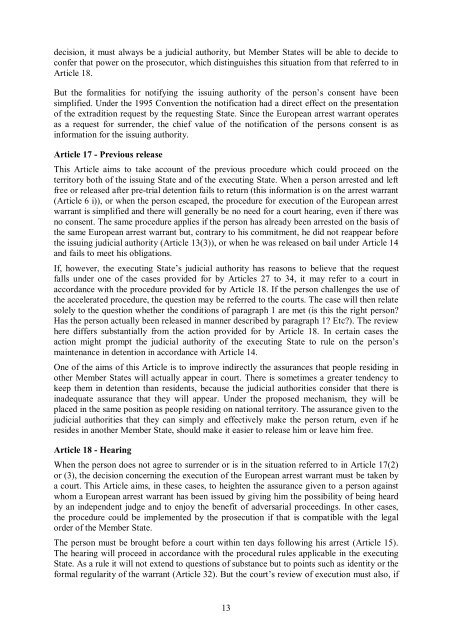the European arrest warrant - Statewatch
the European arrest warrant - Statewatch
the European arrest warrant - Statewatch
You also want an ePaper? Increase the reach of your titles
YUMPU automatically turns print PDFs into web optimized ePapers that Google loves.
decision, it must always be a judicial authority, but Member States will be able to decide to<br />
confer that power on <strong>the</strong> prosecutor, which distinguishes this situation from that referred to in<br />
Article 18.<br />
But <strong>the</strong> formalities for notifying <strong>the</strong> issuing authority of <strong>the</strong> person’s consent have been<br />
simplified. Under <strong>the</strong> 1995 Convention <strong>the</strong> notification had a direct effect on <strong>the</strong> presentation<br />
of <strong>the</strong> extradition request by <strong>the</strong> requesting State. Since <strong>the</strong> <strong>European</strong> <strong>arrest</strong> <strong>warrant</strong> operates<br />
as a request for surrender, <strong>the</strong> chief value of <strong>the</strong> notification of <strong>the</strong> persons consent is as<br />
information for <strong>the</strong> issuing authority.<br />
Article 17 - Previous release<br />
This Article aims to take account of <strong>the</strong> previous procedure which could proceed on <strong>the</strong><br />
territory both of <strong>the</strong> issuing State and of <strong>the</strong> executing State. When a person <strong>arrest</strong>ed and left<br />
free or released after pre-trial detention fails to return (this information is on <strong>the</strong> <strong>arrest</strong> <strong>warrant</strong><br />
(Article 6 i)), or when <strong>the</strong> person escaped, <strong>the</strong> procedure for execution of <strong>the</strong> <strong>European</strong> <strong>arrest</strong><br />
<strong>warrant</strong> is simplified and <strong>the</strong>re will generally be no need for a court hearing, even if <strong>the</strong>re was<br />
no consent. The same procedure applies if <strong>the</strong> person has already been <strong>arrest</strong>ed on <strong>the</strong> basis of<br />
<strong>the</strong> same <strong>European</strong> <strong>arrest</strong> <strong>warrant</strong> but, contrary to his commitment, he did not reappear before<br />
<strong>the</strong> issuing judicial authority (Article 13(3)), or when he was released on bail under Article 14<br />
and fails to meet his obligations.<br />
If, however, <strong>the</strong> executing State’s judicial authority has reasons to believe that <strong>the</strong> request<br />
falls under one of <strong>the</strong> cases provided for by Articles 27 to 34, it may refer to a court in<br />
accordance with <strong>the</strong> procedure provided for by Article 18. If <strong>the</strong> person challenges <strong>the</strong> use of<br />
<strong>the</strong> accelerated procedure, <strong>the</strong> question may be referred to <strong>the</strong> courts. The case will <strong>the</strong>n relate<br />
solely to <strong>the</strong> question whe<strong>the</strong>r <strong>the</strong> conditions of paragraph 1 are met (is this <strong>the</strong> right person?<br />
Has <strong>the</strong> person actually been released in manner described by paragraph 1? Etc?). The review<br />
here differs substantially from <strong>the</strong> action provided for by Article 18. In certain cases <strong>the</strong><br />
action might prompt <strong>the</strong> judicial authority of <strong>the</strong> executing State to rule on <strong>the</strong> person’s<br />
maintenance in detention in accordance with Article 14.<br />
One of <strong>the</strong> aims of this Article is to improve indirectly <strong>the</strong> assurances that people residing in<br />
o<strong>the</strong>r Member States will actually appear in court. There is sometimes a greater tendency to<br />
keep <strong>the</strong>m in detention than residents, because <strong>the</strong> judicial authorities consider that <strong>the</strong>re is<br />
inadequate assurance that <strong>the</strong>y will appear. Under <strong>the</strong> proposed mechanism, <strong>the</strong>y will be<br />
placed in <strong>the</strong> same position as people residing on national territory. The assurance given to <strong>the</strong><br />
judicial authorities that <strong>the</strong>y can simply and effectively make <strong>the</strong> person return, even if he<br />
resides in ano<strong>the</strong>r Member State, should make it easier to release him or leave him free.<br />
Article 18 - Hearing<br />
When <strong>the</strong> person does not agree to surrender or is in <strong>the</strong> situation referred to in Article 17(2)<br />
or (3), <strong>the</strong> decision concerning <strong>the</strong> execution of <strong>the</strong> <strong>European</strong> <strong>arrest</strong> <strong>warrant</strong> must be taken by<br />
a court. This Article aims, in <strong>the</strong>se cases, to heighten <strong>the</strong> assurance given to a person against<br />
whom a <strong>European</strong> <strong>arrest</strong> <strong>warrant</strong> has been issued by giving him <strong>the</strong> possibility of being heard<br />
by an independent judge and to enjoy <strong>the</strong> benefit of adversarial proceedings. In o<strong>the</strong>r cases,<br />
<strong>the</strong> procedure could be implemented by <strong>the</strong> prosecution if that is compatible with <strong>the</strong> legal<br />
order of <strong>the</strong> Member State.<br />
The person must be brought before a court within ten days following his <strong>arrest</strong> (Article 15).<br />
The hearing will proceed in accordance with <strong>the</strong> procedural rules applicable in <strong>the</strong> executing<br />
State. As a rule it will not extend to questions of substance but to points such as identity or <strong>the</strong><br />
formal regularity of <strong>the</strong> <strong>warrant</strong> (Article 32). But <strong>the</strong> court’s review of execution must also, if<br />
13
















